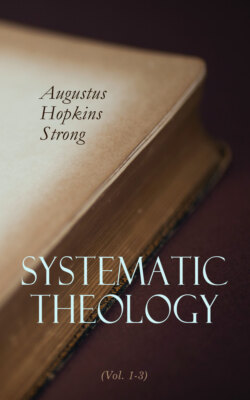Читать книгу Systematic Theology (Vol. 1-3) - Augustus Hopkins Strong - Страница 104
На сайте Литреса книга снята с продажи.
Chapter I. The Attributes Of God.
ОглавлениеTable of Contents
In contemplating the words and acts of God, as in contemplating the words and acts of individual men, we are compelled to assign uniform and permanent effects to uniform and permanent causes. Holy acts and words, we argue, must have their source in a principle of holiness; truthful acts and words, in a settled proclivity to truth; benevolent acts and words, in a benevolent disposition.
Moreover, these permanent and uniform sources of expression and action to which we have applied the terms principle, proclivity, disposition, since they exist harmoniously in the same person, must themselves inhere, and find their unity, in an underlying spiritual substance or reality of which they are the inseparable characteristics and partial manifestations.
Thus we are led naturally from the works to the attributes, and from the attributes to the essence, of God.
For all practical purposes we may use the words essence, substance, being, nature, as synonymous with each other. So, too, we may speak of attribute, quality, characteristic, principle, proclivity, disposition, as practically one. As, in cognizing matter, we pass from its effects in sensation to the qualities which produce the sensations, and then to the material substance to which the qualities belong; and as, in cognizing mind, we pass from its phenomena in thought and action to the faculties and dispositions which give rise to these phenomena, and then to the mental substance to which these faculties and dispositions belong; so, in cognizing God, we pass from his words and acts to his qualities or attributes, and then to the substance or essence to which these qualities or attributes belong.
The teacher in a Young Ladies' Seminary described substance as a cushion, into which the attributes as pins are stuck. But pins and cushion alike are substance—neither one is quality. The opposite error is illustrated from the experience of Abraham Lincoln on the Ohio River. “What is this transcendentalism that we hear so much about?”asked Mr. Lincoln. The answer came: “You see those swallows digging holes in yonder bank? Well, take away the bank from around those holes, and what is left is transcendentalism.” Substance is often represented as being thus transcendental. If such representations were correct, metaphysics would indeed be “that, of which those who listen understand nothing, and which he who speaks does not himself understand,”and the metaphysician would be the fox who ran into the hole and then pulled in the hole after him. Substance and attributes are correlates—neither one is possible without the other. There is no quality that does not qualify something; and there is no thing, either material or spiritual, that can be known or can exist without qualities to differentiate it from other things. In applying the categories of substance and attribute to God, we indulge in no merely curious speculation, but rather yield to the necessities of rational thought and show how we must think of God if we think at all. See Shedd, History of Doctrine, 1:240; Kahnis, Dogmatik, 3:172–188.
